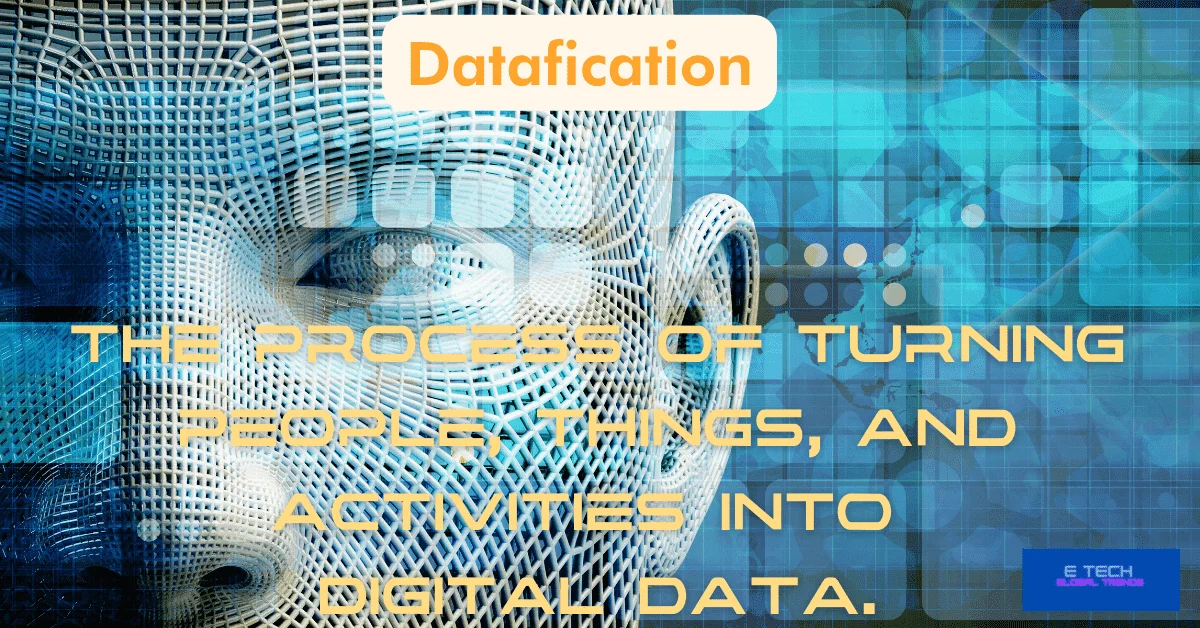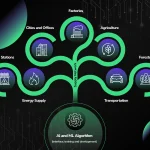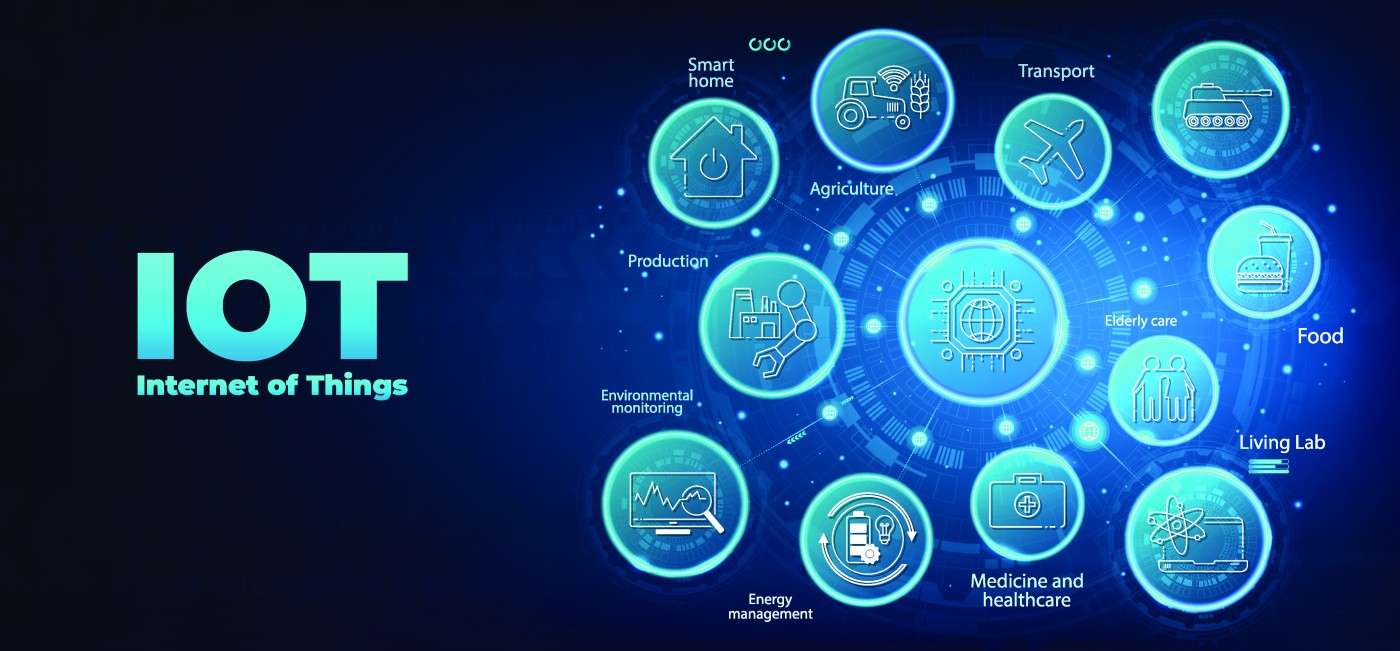Datafication in big data is a transformative process that converts various aspects of business operations into quantifiable data for tracking, monitoring, and analysis. This process aims to empower organizations to make data-driven decisions by leveraging tools and processes to collect and analyze information. Through datafication, businesses gain valuable insights into consumer behavior, trends, preferences, and market dynamics, enabling them to optimize operations, personalize marketing campaigns, forecast future trends, and enhance customer experiences. However, along with the benefits, datafication also presents challenges such as privacy concerns, ethical considerations, and potential biases in data analysis. In this article, we will explore the concept of datafication in big data, its impact on businesses, and the challenges and opportunities it brings.
Datafication, as a concept within big data, involves the conversion of various aspects of a business into quantifiable data that can be tracked, monitored, and analyzed. This data-driven approach has gained prominence in modern business practices, thanks to authors Viktor Mayer-Schonberger and Kenneth Cukier who popularized the concept. By embracing datafication, organizations can leverage analytics, personalized marketing campaigns, and predictive forecasting to drive growth, efficiency, and gain a competitive edge.
The Evolution of Datafication and its Role in Modern Business

The evolution of datafication has significantly impacted modern businesses, with companies increasingly relying on data to inform decision-making processes and strategies. By utilizing data-driven insights, organizations can identify opportunities for improvement, optimize operations, and enhance customer experiences. Through datafication, businesses can extract valuable information on market trends, consumer behavior, and operational efficiencies, leading to increased revenue, cost reduction, and improved customer satisfaction.
Key Components of the Datafication Process
One key component of the datafication process is the use of location-based technology to gather and analyze vast amounts of data. This enables businesses to gain rich insights into physical spaces and customer interactions. Advanced solutions like Mapsted’s indoor location intelligence technology empower companies to track customer behavior, optimize operations, and deliver personalized experiences. By leveraging datafication and location technology, businesses can make informed decisions, enhance customer engagement, and maintain a competitive edge in today’s data-centric business landscape.
The Impact of Datafication on Business Operations
Datafication is a transformative trend that is reshaping the way businesses operate by converting social actions into quantifiable data for real-time tracking and predictive analysis. This shift towards data-driven decision-making is enhancing business operations by allowing organizations to monitor, track, analyze, and optimize previously invisible processes and activities. With the advancements in technology, datafication is enabling businesses to extract new forms of value from the information they collect, ultimately transforming them into data-driven enterprises. By leveraging data-driven insights, businesses can make more informed decisions that drive efficiency and innovation in their operations.
Enhancing Decision-Making with Data-Driven Insights
One of the key benefits of datafication for businesses is the potential for increased efficiency, reduced costs, and enhanced revenue. By embracing data-driven strategies, companies can identify opportunities to optimize their operations, create new revenue streams, and improve customer satisfaction through personalized experiences and targeted promotions. Additionally, datafication has transformed customer engagement by enabling companies to provide personalized experiences and relevant content based on customer behavior data. This level of personalization leads to a better customer experience, increased engagement, and ultimately, customer loyalty.
Optimizing Operations Through Predictive Analysis
Datafication enables businesses to optimize operations through predictive analysis. By harnessing the power of data, organizations can anticipate trends, identify patterns, and make proactive decisions that improve efficiency and effectiveness. Predictive analysis empowers businesses to forecast future outcomes, mitigate risks, and capitalize on opportunities, ultimately leading to more streamlined and optimized business operations. This proactive approach to decision-making helps businesses stay ahead of the curve and adapt to evolving market dynamics, giving them a competitive edge in today’s data-driven landscape.
Personalization of Marketing Strategies
Another significant impact of datafication on business operations is the personalization of marketing strategies. By leveraging customer data and insights, businesses can tailor their marketing efforts to individual preferences, behaviors, and needs. This personalized approach allows organizations to deliver targeted and relevant messages, products, and services to their customers, resulting in higher engagement, conversion rates, and customer satisfaction. Data-driven personalization not only enhances the customer experience but also drives business growth and loyalty, ultimately shaping the way businesses interact with their target audience and differentiate themselves in the market.
Forecasting Trends and Consumer Behavior

Datafication enables businesses to forecast trends and consumer behavior, providing valuable insights that inform strategic decision-making and drive business growth. By analyzing data trends and patterns, organizations can anticipate market shifts, consumer preferences, and emerging opportunities, allowing them to adapt their strategies and offerings accordingly. This proactive approach to trend forecasting enables businesses to stay agile, responsive, and competitive in a fast-paced and data-driven environment. By leveraging data to predict future trends and consumer behavior, businesses can position themselves for success and drive innovation in their operations, ultimately shaping the way they engage with their target audience and remain relevant in the market.
Datafication is a transformative process that involves turning various aspects of a business into quantifiable data that can be tracked, monitored, and analyzed. By collecting and analyzing data, businesses can gain valuable insights into consumer behavior, trends, and preferences, allowing them to make informed decisions that drive growth and success. This data-driven approach can significantly impact areas such as analytics, marketing campaigns, and forecasting, leading to increased efficiency, reduced costs, and enhanced revenue.
Driving Business Growth and Efficiency
Datafication has opened up a world of opportunities for driving business growth and efficiency. By transforming social actions into quantified data, organizations can now engage in real-time tracking and predictive analysis to optimize their operations. This shift towards data-driven enterprises allows businesses to make informed decisions based on data, leading to improved productivity and streamlined processes. From updating risk profiles in insurance to identifying employee risk-taking profiles in human resources, datafication is revolutionizing the way businesses operate and make strategic decisions.
Improving Customer Experiences
Furthermore, datafication plays a crucial role in improving customer experiences. Social platforms like Facebook and Instagram use data information to personalize marketing efforts and surveillance services, ultimately shaping consumer behavior. By leveraging data to inform content creation and recommendation systems, businesses can tailor their offerings to meet the evolving needs and preferences of their customers. The ability to analyze data and extract valuable insights allows companies to enhance their customer engagement strategies, leading to higher satisfaction levels and long-term loyalty.
Gaining Competitive Advantage in the Market
Moreover, datafication provides a competitive advantage in the market by enabling organizations to stay ahead of the curve. Netflix’s transformation from a physical disc rental model to a data-driven streaming service exemplifies the power of datafication in driving innovation and staying relevant in a rapidly changing market landscape. By leveraging data to personalize recommendations and enhance user experiences, companies can differentiate themselves from competitors and attract a larger customer base. In today’s data-driven world, the ability to harness the power of datafication is essential for businesses looking to thrive and succeed in a highly competitive market.
Challenges and Considerations in Datafication

Addressing Privacy and Security Concerns
Datafication, the process of transforming various aspects of business into quantifiable data for analysis and decision-making, presents significant challenges in terms of privacy and security. With the increasing collection and analysis of large amounts of data, there is a heightened risk of sensitive information being compromised. It is imperative for businesses to implement robust security measures to safeguard customer data and prevent unauthorized access. This includes encryption, access controls, regular security audits, and compliance with data protection regulations such as GDPR.
Navigating Ethical Considerations in Data Use
Another crucial aspect of datafication is navigating ethical considerations in data collection and use. Transparency is key in ensuring ethical data practices, as companies must be upfront about the data they collect and how it is used. This transparency helps to build trust with customers and stakeholders. Additionally, ethical guidelines and frameworks should be established to guide the responsible use of data, ensuring that decisions made based on data analysis are fair, transparent, and accountable. This includes considerations around consent, transparency, and the potential impact of data-driven decisions on marginalized communities.
Mitigating Potential Biases in Data Analysis
Mitigating potential biases in data analysis is essential to ensure accurate and reliable insights. Biases, whether in sample selection or algorithms, can lead to misleading conclusions with significant consequences for businesses. To avoid biases, companies must use reliable data sources, ensure diverse representation in data sources, and design algorithms that prevent discrimination. Regular reviews and audits of data analysis processes are also necessary to identify and address any biases that may impact the outcomes of data-driven decisions.
Real-World Applications and Case Studies
Datafication in Retail and E-Commerce
Datafication is a transformative process that converts various aspects of business into quantifiable data for tracking, monitoring, and analysis. In the retail and e-commerce sector, datafication plays a crucial role in enhancing customer experiences, improving inventory management, and personalizing marketing efforts. By leveraging data analytics, retailers can gain valuable insights into consumer behavior and preferences, allowing them to tailor their offerings and marketing strategies accordingly. This data-driven approach enables companies to optimize supply chain management, enhance operational efficiency, and ultimately drive sales growth.
Impact on Healthcare and Medical Research
Datafication also has a significant impact on the healthcare and medical research industry. By utilizing data-driven insights, medical professionals can improve patient care, predict health trends, and develop personalized treatment plans. Datafication enables medical researchers to analyze large datasets for disease diagnosis, treatment outcomes, and predictive analytics. This data-driven approach empowers healthcare providers to make informed decisions, enhance patient outcomes, and ultimately improve the quality of care delivered to patients.
Transforming Social Media with Datafication
Social media platforms have undergone a transformation with the integration of datafication processes. Companies utilize data analytics to enhance user engagement, target advertisements, and personalize content recommendations. By analyzing user data, social media platforms can deliver personalized experiences, increase ad revenue, and drive user retention. Datafication enables social media companies to understand user behavior, preferences, and trends, allowing them to tailor their services and offerings to meet the needs of their audience.
Case Studies of Successful Datafication Strategies

Successful case studies of datafication strategies highlight the benefits of leveraging data to drive business transformation and innovation. For example, Netflix’s transition from a physical disc rental model to a data-driven streaming service showcases the power of data in adapting to changing consumer preferences and market dynamics. By analyzing user data and behavior, Netflix was able to personalize content recommendations, improve user experiences, and stay competitive in the digital landscape. These case studies underscore the importance of data-driven decision-making and the value of incorporating datafication strategies into business operations.
Datafication is a transformative process that aims to convert various aspects of business into quantifiable data that can be tracked, monitored, and analyzed. By leveraging data-driven insights, businesses can make informed decisions, streamline operations, and develop effective marketing strategies. This data-driven approach can lead to increased efficiency, reduced costs, enhanced revenue, and improved customer satisfaction, providing a significant competitive advantage over peers. Additionally, datafication allows companies to offer personalized experiences and targeted promotions, leading to increased customer loyalty and repeat business.
Predicting the Next Wave of Datafication Innovations
Datafication is a significant trend in the world of data science, where social actions are transformed into quantified online data for real-time tracking and predictive analysis. This process allows for the monitoring, tracking, analysis, and optimization of previously invisible processes, turning them into valuable data that can drive decision-making and innovation. Through datafication, organizations can become data-driven enterprises, leveraging information in new and impactful ways to create value and drive efficiencies.
Harnessing Data for Innovation
- Converting social actions into data for insights
- Anticipating market trends and consumer behavior
- Driving growth and success through informed decisions
The Growing Importance of Ethical Data Use
Ethical data use is becoming increasingly important in the age of datafication, as businesses must consider the ethical implications of collecting and analyzing data. Privacy and security concerns are significant challenges that companies must address to protect sensitive information and prevent unauthorized access. Transparency in data collection and use is crucial to maintain the trust of customers and avoid ethical issues. Furthermore, businesses must ensure that biases in data analysis are minimized to avoid inaccurate or misleading insights that can have significant consequences for their operations.
Ensuring Ethical Data Practices
- Prioritizing data privacy and security
- Emphasizing transparency and accountability
- Minimizing biases in data analysis
Datafication’s Role in Emerging Technologies
Datafication plays a crucial role in the evolution of emerging technologies, as companies leverage data to stay ahead of the competition and drive innovation. Predictive analytics enables businesses to forecast future trends and anticipate changes in consumer demand, giving them a competitive edge in the market. Location-based technology, such as Mapsted’s advanced solutions, offers businesses the ability to gather vast amounts of data for rich insights into customer behavior and interactions within physical spaces. By leveraging technology that requires no hardware or infrastructure, companies can create personalized experiences, optimize operations, and make informed decisions based on real-time data.
Leveraging Data for Technological Advancements
- Utilizing predictive analytics for forecasting
- Gathering rich insights through location-based technology
- Creating personalized experiences and optimizing operations
conclusion
In conclusion, datafication in big data is a transformative trend that is reshaping the way businesses operate by converting various aspects of a business into quantifiable data for tracking, monitoring, and analysis. By leveraging technological enablers, businesses can make informed decisions, enhance customer engagement, and maintain a competitive edge in today’s data-centric business landscape. Despite the opportunities presented by datafication, there are also challenges such as privacy and security concerns that need to be addressed. Real-world applications and case studies in retail and e-commerce demonstrate the significant impact of datafication on enhancing customer experiences and personalizing marketing efforts. Looking towards the future, datafication will continue to evolve, providing companies with valuable insights to optimize operations, create new revenue streams, and improve customer satisfaction. Embracing data-driven strategies will be essential for businesses to thrive in an increasingly data-driven world.









